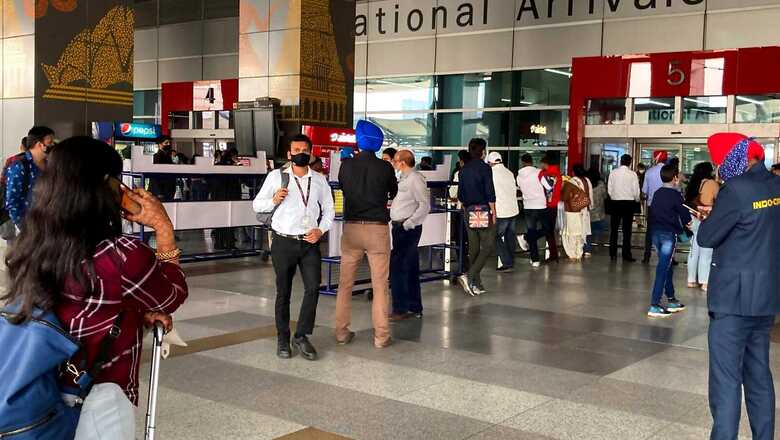
views
The possibility of another disastrous wave in the country has increased with the discovery of a new SARS-CoV-2 variant, Omicron, and two such cases being detected in Karnataka. This has come along with the Union government issuing new travel guidelines on November 30. A likelihood of the country putting a partial or complete international travel ban is doing the rounds. Recently, Delhi Chief Minister Arvind Kejriwal issued a statement urging the government to not further delay the curbs on international flights. But contrary to popular belief, an immediate air travel ban can do more harm than good. Moreover, the question arises: is it economically feasible, logically valid and morally correct?
Current Guidelines for International Travel
As per the recent guidelines issued by the Government of India, all travellers have to get their RT-PCR reports, not older than 72 hours. Also, passengers from “at-risk” nations will be tested upon arrival and will not be allowed to leave the airport until the results of their RT-PCR tests are known. If found negative, they will be quarantined at home for seven days before being re-tested on the eighth day. If found positive, passengers will be isolated and treated, and their samples will be forwarded to INSACOG (Indian SARS-CoV-2 Genomics Consortium) to determine the virus strain. Further, all states and UTs have to intensify their testing and tracking strategy and focus on accelerating the vaccination drive. Health infrastructure readiness, such as augmenting ICU wards, oxygen cylinders, beds, ventilators, and other equipment, has been recommended.
Travel Bans: More Harm than Good
To begin with, we are just being naive by assuming that if we block air travel, the variant will not travel. Two confirmed cases of Omicron have been reported in Karnataka at the time of writing this article, it is certain that the new strain is already here. We’ve seen it before: a complete travel ban during the first two COVID waves did not prevent the virus from spreading, although there was a small delay in its inevitable spread. Even though the initial preliminary data shows that Omicron has higher transmissibility than Delta, this ban would have no benefit. Eliminating air travel does not mean just an end to tourism. Banning travel will also hinder the import of essential products and services such as anti-COVID medicines, vaccines and drugs.
Banning flights from countries with confirmed cases does not make sense either. This is because there would be incoming flights from countries that have the virus but where the cases may not have been detected/confirmed yet. The variant will find a way to survive and spread.
Travel Bans: Impact on Economy
Travel bans can have quite a damaging impact on the economy of both India and the countries from where travel is restricted. Besides restricting tourism, it also hinders trade and business. India’s economy shrunk 7.3 per cent in 2020-21 fiscal, and blocking international travel will further affect business. India’s foreign exchange earnings from tourism in 2019 stood at nearly $30 billion—following the pandemic, it nosedived to estimated $6 billion in 2020.
As per Moody’s Investors Services, “The emergence of the new variant also comes during a period of fragile economic recovery, with stretched supply chains, elevated inflation and labour market shortages. Business disruption resulting from the spread of the new variant could prevent supply chain stresses from easing, dampening productive capacity and stoking further cost pressures in sectors with exposure to global supply chains.” Any further loss will dampen economic recovery.
Countries often impose such travel bans because they appear to be the most obvious step. But, these bans have a detrimental effect, weakening our already contracted economy.
Travel Bans: Punishing a Good Deed
Thanks to the efforts of the diligent scientists in South Africa, the new variant, Omicron, was detected and the world came to know about this new danger. But they are now being punished for it. Travel bans are compromising their ability to fight the virus. Scientists are reporting an inability to get regents for studying the virus. This is affecting the outflow of essential information from the countries affected by the ban. We are creating disincentives for the countries to do rigorous genomic surveillance and transparently report new variants. Even when South Africa diligently followed previously agreed upon obligations under International Health Regulations, a WHO legal framework requiring countries to report public health events, it is facing undeserved negative consequences. Justifying the saying, “No good deed goes unpunished”.
Cooperate, Don’t Shut Down Borders
We have far more critical things to worry about right now than emphasising an air travel ban. To begin with, all states and Union Territories must stay vigilant and monitor the situation in their geographies. An uptick in vaccination drive must accompany this. So far, we don’t have any statistics on vaccine inefficiency; therefore, vaccine is our best shot against COVID. We must enforce wearing of masks in public places, maintaining social distance and following hand hygiene, at all times. The present genome sequencing estimations in India are based on evaluating only 0.2 per cent of the total samples. It is imperative that we increase it to at least 5 per cent. INSACOG can also be asked to release its comprehensive data and daily updates. More private laboratories should be roped in for enhancing genomic surveillance in the country.
This is the time for global cooperation, not shutting down borders, which will anyway lead to adverse outcomes. Targeting a few countries will do no good and impact the fight against COVID-19. As WHO says, “COVID-19 constantly exploits our divisions. We will only get the better of the virus if we work together for solutions.”
Mahek Nankani is Assistant Programme Manager, The Takshashila Institution. Harshit Kukreja is Research Analyst, The Takshashila Institution. The views expressed in this article are those of the authors and do not represent the stand of this publication.
Read all the Latest Opinions here

















Comments
0 comment